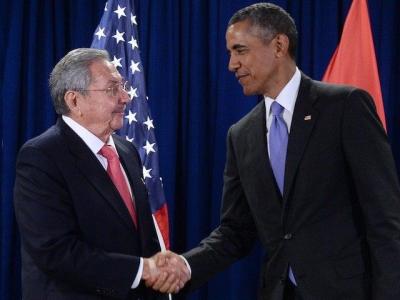 A Reuters exclusive report suggests that President Barack Obama will announce new concessions to Cuba’s communist dictatorship shortly before his arrival on the island on March 21, aimed at easing travel restrictions and allowing the Cuban government to enrich itself through tightly controlled business ventures.
A Reuters exclusive report suggests that President Barack Obama will announce new concessions to Cuba’s communist dictatorship shortly before his arrival on the island on March 21, aimed at easing travel restrictions and allowing the Cuban government to enrich itself through tightly controlled business ventures.
Reuters reports that the White House is expected to announce new measures “expected to include changes to make it easier for individual Americans to visit Cuba … as well as further loosening of trade and banking rules, said the sources, who were briefed on the matter by administration officials.” The news agency cites various “U.S. congressional sources” as revealing the proposed adjustments to the relationship between the United States and the Castro regime.
“The White House wants to make a splash on the economic front before Obama gets to Havana, and this is one way to do it,” Reuters’ source tells them, suggesting Americans should expect the announcement shortly before the President’s visit.
Reuters reports significant outrage by both Republicans and Democrats regarding the possibility of even more concessions to the Castro regime. Since announcing on December 17, 2014, that his government would work to legitimize Raúl Castro and repeal decades of sanctions against Cuba, President Obama has allowed the authorization of daily flights to Cuba and removed the nation from the State Department’s State Sponsors of Terrorism list, despite ample evidence that Castro’s government aids organizations like Hezbollah and the Revolutionary Armed Forces of Colombia (FARC).
“Shouldn’t we get something from the Cubans in return?” Reuters quotes one congressional source as lamenting.
In a 3,000-word victory lap, Cuba’s state newspaper, El Granma, answers that question with a resounding “no.” The newspaper’s editorial board writes in the extensive column that the government will not “have to renounce a single one of its principles” as a communist state. It cites the Castro government’s decision to engage President Obama as a product of “the heroic resistance of the Cuban people and its loyalty to its principles,” alleging that the talks are a victory in forcing “the United States to admit … the failure of a policy of open hostility towards the Revolution.”
The editorial demands that President Obama give America’s naval base in Guantánamo Bay, the only free territory on the island of Cuba, back to the Castro dictatorship. It also demands a complete repeal of the embargo against the Castro government and censorship of American broadcasts to which Cubans seeking news from a free press have developed the ability to listen; this is available through innovations using the archaic radio technology available to average Cuban citizens. The article also demands that the United States no longer grant political asylum to Cuban nationals fleeing communist oppression or Cuban doctors seeking an escape from the nation’s $8-million-a-year medical slavery program.
President Raúl Castro has personally demanded all these concessions on multiple occasions. Granma adds one more: the repeal of an executive order deeming the nation of Venezuela a “national security threat,” which President Obama extended this month.
The editorial concludes:
One cannot abide by the most minimal doubt regarding the unlimited commitment of Cuba to its revolutionary, anti-imperialist ideals, and its foreign policy committed to the just causes of the world, the defense of self-determination of peoples, and the traditional support of our brotherly countries.
During his overnight trip to Cuba – the first by a sitting U.S. president since 1928 – President Obama is expected to discuss expanding on economic opportunities with Castro. He will then travel to Argentina, where he will meet with popular conservative President Mauricio Macri. He is expected to bring up “human rights” with Macri.
In perhaps a small sign that the Obama administration is growing frustrated with Cuba’s obstinacy regarding human rights, Secretary of State John Kerry canceled a proposed trip to Cuba shortly before President Obama’s. Reports conflict on whether Cuba’s refusal to allow Kerry to meet with dissidents doomed the trip, however, or whether it was canceled because the nascent American embassy in Cuba was logistically unable to plan the visit.
The Cuban government has significantly increased operations aimed at repressing political dissidents since the December 2014 declaration. The Cuban Commission for Human Rights and National Reconciliation (CCDHRN), an NGO, reports this week that Cuba has already made at least 2,555 politically motivated arrests in 2016.
Source: Breitbart
